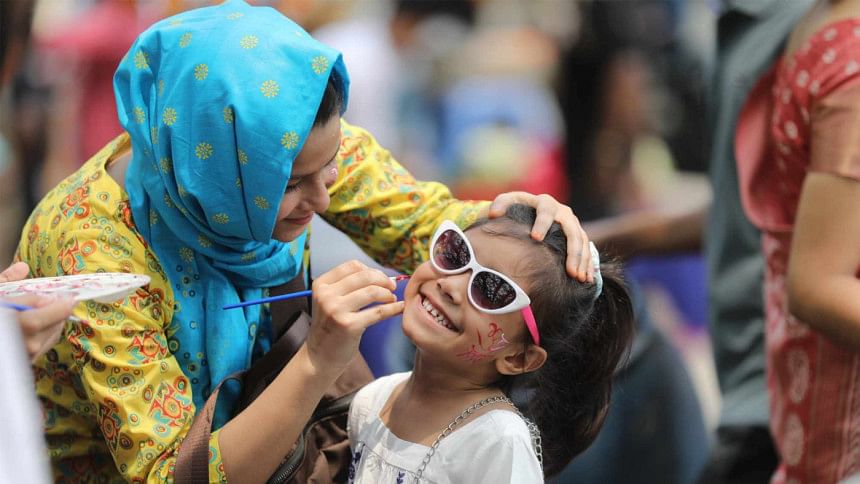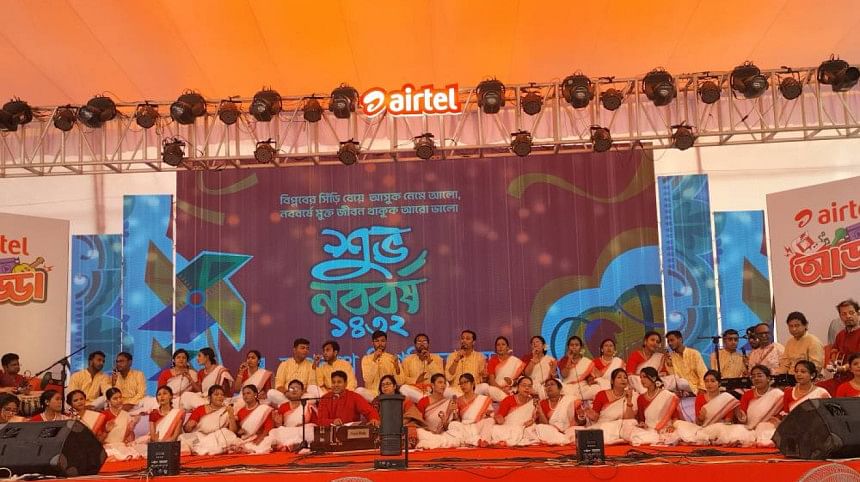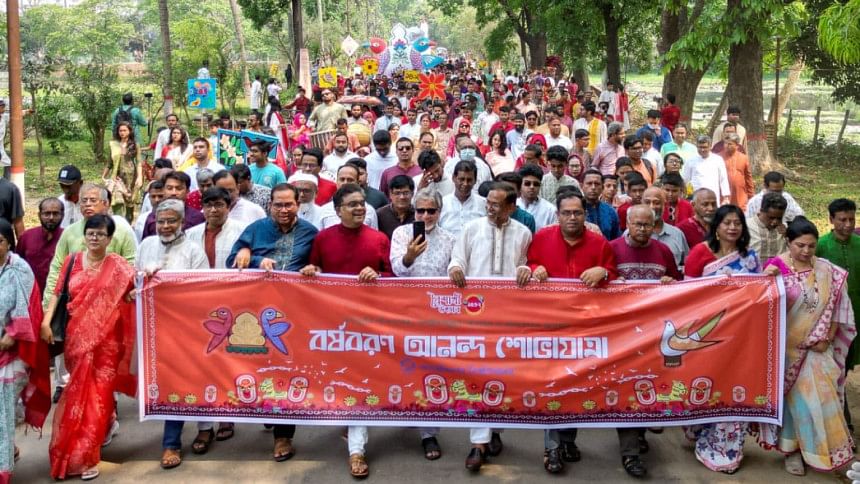Of music, colours and festivities: Nation welcomes Bangla New Year
The nation welcomes the Bangla New Year 1432 with a jubilant spirit and celebrates Pahela Baishakh, the first day of the Bangla calendar, with music, colourful rallies, and festive events, today.
With the first rays of the Sun visible at dawn, Chhayanaut’s iconic musical performance to celebrate the New Year began at Ramna Batamul. With the theme “Amar Mukti Aloy Aloy” (my freedom lies in the light), the performance aimed to convey a message of hope, resilience and renewal.
Thousands of Bangalees gathered at Ramna Batamul since the morning to participate in the celebrations.

The event began with a classical musical performance of Raga Bhairav, followed by a total of 24 performances, including nine choral songs, 12 solo renditions, and three recitations.

Also in the morning, the Ispahani Channel i ‘Shurer Dhara’ celebration of Pahela Baishakh 1432 began at Dhanmondi’s Rabindra Sarobar at around 6:00am, with the title “Alo Amar Alo” (light, my light), in a vibrant homage to the spirit of patriotism.
The event marked soulful renditions of the ‘Panchakabi’ —Rabindranath Tagore, Kazi Nazrul Islam, Dwijendralal Roy, Rajanikanta Sen, and Atul Prasad Sen — performed by musicians of Shurer Dhara. The event began with Tagore’s “Alo Amar Alo”, followed by Nazrul’s “Probhat Bina Tobo Baaje Hey”.

Indigenous artistes from different ethnic communities from the Chittagong Hill Tracts, Mymensingh, and northern regions of Bangladesh also participated in the event. Dressed in traditional attire, the performers presented their folk songs and dances, adding rich cultural diversity to the theme of national unity. They also performed the song “Amader Desh Heera-Manik, Shona, Rupay Bhora” in their regional languages.
Later, at around 9:00am, the Faculty of Fine Arts of Dhaka University brought out the “Borsho Boron Anondo Shobhajatra”, formerly called ‘Mangal Shobhajatra’, the iconic rally celebrating the festive spirit of Pahela Baishakh.

People from all walks of life, including those from the different ethnic communities of the country, participated in the joyous and colourful procession that began from the Charukola Institute premises and proceeded through Shahbagh intersection, TSC intersection, Central Shaheed Minar, and Doel Square, before returning to the Charukola Institute via the road in front of the Bangla Academy.
This year, procession carries the theme, “Symphony of the New Year, End of Fascism,” designed to capture the spirit of the July uprising and to express solidarity with the people of Palestine. Among the featured motifs were the “Portrait of Fascism,” depicting the face of ousted prime minister Sheikh Hasina, and a dove figure symbolising peace.

Jagannath University welcomed the Bengla New Year 1432 with a colorful celebration, including a festive rally, cultural performances, and a Baishakhi Fair. The day began with a celebratory procession organised by the university’s Faculty of Fine Arts, featuring bullock carts, animal and bird motifs, floral decorations, and other symbols of rural heritage.

As part of the Baishakhi Fair, stalls have been set up on the campus including at the Open Stage (Muktomoncho), offering a variety of traditional items including handicrafts, pitha-puli (rice cakes), jewellery, clay toys, books, and publications. The cultural programme featured music, dance, recitations, and a performance of the popular folk play ‘Velua Sundari’. A band concert is scheduled to begin at 3:00pm as part of the event.
Jahangirnagar University took on a vibrant and festive look as it welcomed the Bangla New Year 1432. The day-long celebration began early in the morning with the iconic “Esho He Boishakh” song. Guests were treated with traditional Bangalee delicacies, such as jilapi, sandesh, kadma, watermelon, mango sherbet, batasha, puffed rice, and popped rice.

At around 9:45am, a colorful and jubilant Baishakhi Shovajatra was brought out on the campus. A cultural programme is scheduled to be held later in the evening at the Selim Al Deen Muktomoncho, organised by JU’s Teachers-Students Centre (TSC) and the Centre for Student Welfare and Counseling.
Different departments of the university contributed to the day-long festivities by hosting book fairs, puppet shows, musical plays, traditional Jatra Pala, folk songs, and instrumental performances, creating a lively and inclusive cultural atmosphere on the campus.
Meanwhile, the Marma and Mro communities are celebrating their vibrant New Year festival – “Sangrai Powe” and “Chakran Powe” — in Bandarban, with colourful processions and the veneration of the elders.
The event was officially inaugurated yesterday morning at the traditional Bomang King’s ground. It will continue from today to April 19. During this period, cultural performance including music and dance, traditional water-splashing, pitha festivals, wrestling competitions, and various other events will be held.

The Sangrai Festival Celebration Committee is the organiser of this year’s events. Communities such as the Marma, Mro, Chak, Khumi, and others will celebrate the Sangrai festival.
Chief Adviser of the interim government Professor Muhammad Yunus today wished the countrymen “Shubha Nababarsha” (happy new year in Bangla), and called upon all to not squander this opportunity of building a country free of discrimination.

“Come, let’s forget the shame, the pain, the ugly and the evil of the past, and march forward with renewed resolve and enthusiasm. Let us build a new Bangladesh,” he said.
Prof Yunus said the uprising of 2024 has brought forth an opportunity to get rid of all discriminations from the country.
“Let us not squander this opportunity… Let it be this new year’s resolution that we build a new Bangladesh free of discrimination,” he urged.

The Nobel peace laureate noted that Pahela Baishakh remains an integral part of Bangalee heritage and culture, and serves as an opportunity to showcase Bangalee tradition and culture amid festivities.
LondonGBDESK//



Comments are closed.